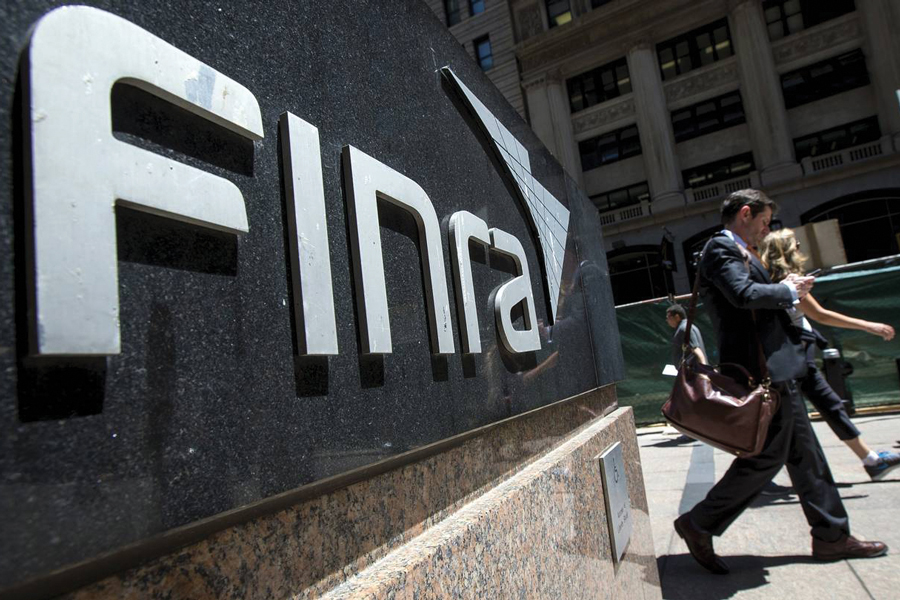

A Washington, D.C., federal court this week prevented Finra from expelling a brokerage it found to have harmed customers, but the regulator is confident it can defend its enforcement authority in that case and a separate one that was filed earlier this month.
Tuesday, the U.S. Court of Appeals for the D.C. Circuit upheld a preliminary injunction against the Financial Industry Regulatory Authority Inc. that allows Alpine Securities Corp. to continue to conduct business while it appeals a March 2022 Finra decision barring the firm from the financial industry.
Finra claimed Alpine misused customer funds and securities, charged unreasonable fees and engaged in unauthorized trading and capital withdrawal. The broker-dealer self-regulator ordered Alpine to pay $2.3 million in restitution to customers and issued a permanent cease-and-desist order.
A three-judge panel of the D.C. court issued the preliminary injunction against Finra on July 5. Judge Justin Walker, who was in the majority on the 2-1 decision, responded favorably to Alpine’s assertion that Finra violated the Constitution because its disciplinary hearing officers weren’t properly appointed by the executive branch.
“At this early stage, Alpine has raised a serious argument that Finra impermissibly exercises significant executive power,” Walker wrote.
Finra filed a motion to lift the injunction, which the court denied Tuesday.
“While disappointed with the decision on this motion, Finra looks forward to the D.C. Circuit’s consideration of plaintiffs’ appeal, when Finra and the United States Government will present their defenses to plaintiffs’ novel and unsupported constitutional arguments,” Finra said in a statement through spokesperson Ray Pellecchia.
Another challenge to Finra’s enforcement authority comes in a suit filed last Friday in a D.C. federal court by broker Eugene H. Kim. In a July action, Finra alleged Kim misused customer funds in connection with a private placement offering sold by his firm, according to Kim’s BrokerCheck profile.
“In practice, Finra is nothing more than the federal government’s private, outsourced mall cop that metes and doles arbitrary ‘discipline’ unto securities professionals while escaping actual supervision and control by the Executive (let alone the Legislative or Judicial) branch,” Kim’s complaint states.
Finra is confident it will prevail over Kim in court.
“Finra believes it has strong defenses to the claims being made,” the regulator said in a statement. “Finra’s constitutionality has been affirmed by courts time and again in similar challenges.”
The Alpine case is similar to one the Supreme Court heard several years ago. In that case, investment advisor Ray Lucia argued that the SEC’s in-house administrative law judges were unconstitutional. The high court ruled in Lucia’s favor in a 2018 decision, saying ALJs had to be appointed directly by the SEC rather than by the chief ALJ.
“Finra’s hearing officers are near carbon copies of those ALJs,” Judge Walker wrote. He added that they “exercise significant executive power,” and “[t]hat may be a constitutional problem.”
Hugh Berkson, a partner at McCarthy Lebit Crystal & Liffman, said Alpine’s argument is “clever” but added that the firm “is no stranger to regulatory enforcement actions.” The brokerage has 48 disclosures on its BrokerCheck profile.
“Rather than reform their business practices to conform with industry rules and regulations, they instead have decided to challenge the constitutionality of the regulator itself,” said Berkson, who also is president of the Public Investors Advocate Bar Association.
But Alpine did get the attention of Judge Walker, which might bode well for its argument that there’s a problem with how Finra disciplinary officers are appointed.
“Those issues are going to get a hard look from the court,” said Kurt Wolfe, counsel at Quinn Emanuel.
Someone else who took notice of the Alpine case is SEC Commissioner Mark Uyeda. Earlier this week, he voted against a new rule that will require more brokerages to register with Finra.
“As the Commission weighs the costs and benefits of these rule amendments, the adopting release is dismissive of any impact a near-universal mandate to join Finra might have on the question as to whether Finra should be considered a state actor, and fails to consider the concerns of at least one judge on the D.C. Circuit in Alpine Securities Corporation v. Finra, which was issued last month,” Uyeda said at an SEC open meeting Wednesday.
Despite the court challenges, there’s not a real threat that Finra will be abolished, Wolfe said.
“I don’t think Finra should be concerned about its existence,” Wolfe said. “Should it be concerned that some of its power could be stripped away? You can imagine a world in which that could happen.”

Rajesh Markan earlier this year pleaded guilty to one count of criminal fraud related to his sale of fake investments to 10 clients totaling $2.9 million.

From building trust to steering through emotions and responding to client challenges, new advisors need human skills to shape the future of the advice industry.

"The outcome is correct, but it's disappointing that FINRA had ample opportunity to investigate the merits of clients' allegations in these claims, including the testimony in the three investor arbitrations with hearings," Jeff Erez, a plaintiff's attorney representing a large portion of the Stifel clients, said.

Chair also praised the passage of stablecoin legislation this week.

Maridea Wealth Management's deal in Chicago, Illinois is its first after securing a strategic investment in April.
Orion's Tom Wilson on delivering coordinated, high-touch service in a world where returns alone no longer set you apart.
Barely a decade old, registered index-linked annuities have quickly surged in popularity, thanks to their unique blend of protection and growth potential—an appealing option for investors looking to chart a steadier course through today's choppy market waters, says Myles Lambert, Brighthouse Financial.
